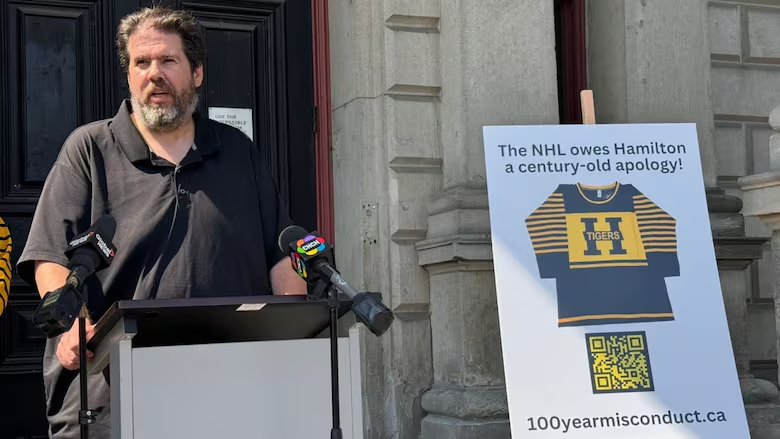Latest Ads
-
Jasmine Jewel
Call
-
Omidan group
Call
-
Amir Madanpour
Call
-
Dimo studio
Call
-
Yorkacademy
Call
-
Maryambagheri
Call
-
Shishlix Restaurant
Call

Labour advocates demand NHL apologize for relocating Hamilton Tigers when they went on strike in 1925
Anthony Marco, president of the Hamilton and District Labor Council, helped launch a campaign calling for the NHL to apologize for moving the Hamilton Tigers to New York City as a result of a 1925 strike. (Aura Carneio Rosas/CBC)
Social Sharing
Local labor advocates are calling on the National Hockey League (NHL) to right what they call a historic wrong when the league penalized the city's NHL team for a strike in 1925.
“It's an injustice that no one has taken responsibility for in 100 years,” said Anthony Marco, president of the Hamilton and District Labor Council, on Wednesday. He helped launch a campaign calling for the NHL to apologize for moving the Hamilton Tigers to New York City as a result of a strike.
The Tigers were expected to play six extra games without pay and refused to pay an additional $200 on top of their $3,000 contract.
The five-year NHL team was at the top of the league that year and a strong contender for the Stanley Cup, which at the time was a contest between the NHL champion and the Western Canadian Hockey League winner.
How the NHL eliminated the Hamilton hockey franchise 100 years ago after players struck for $200
In response, the league moved the team to New York City and asked the players to write formal letters of apology to then-president Frank Calder and pay a $200 fine if they wanted to play in the NHL again.
The campaign, launched Wednesday and titled “100 Years of Misconduct,” includes an online petition calling on the NHL to apologize. Markow said organizers hope to gather signatures from Hamilton residents and beyond, hockey fans and professional athletes whose current salaries and contracts were won after early labor struggles like the one taken by the Tigers.
“Labor stands behind those who fought,” Markow said. “If you’re a hockey fan, that should matter to you.”
“I would do the same thing tomorrow,” the striking player said decades later.
Mayer Siamiatsky, a politics professor at Metropolitan University of Toronto who has researched the Tigers strike, says the team’s relocation had an emotional and financial impact on the city of Hamilton that lasted for years.
Hamilton Tigers circa 1925.
Hamilton Tigers players, shown here in 1925, were denied a $200 raise they had requested for playing six extra games. The team was suspended, then sold and relocated to New York. (Red Canoe Productions)
He said the campaign “holds the NHL accountable for the disaster they committed against a great hockey team and the city of Hamilton.”
CBC Hamilton reached out to the NHL for comment but did not receive a response Wednesday.
According to Siamiatki, Hamilton Tigers captain Shorty Greene said at the time that if the league owners are making money from the extra games, the players should too.
Siamiatki quoted Greene as saying Wednesday:
“Professional hockey is a money-making business. The promoters are in it for what they get out of it, and if the players don’t see it that way, they won’t be in it. Why should we be asked to play two more playoff games to sweeten the league’s finances?”
[Image of two people standing behind the podium. One is wearing a hockey jersey.]
Mayer Siamiatsky, a politics professor at Metropolitan Toronto University who has researched the Tigers strike, says the NHL has “done a disaster … to a great hockey team.” He is pictured with Frank Crowder, president of Steelworkers Local 7135, who is seen wearing a Tigers jersey. (Aura Carnevale/CBC)
“It’s a common phrase that exists in the history of labor,” Siamiatsky noted. “The workers are forced to do more work, while the profits and revenues go to the owners.”
Green went on to play with the New York Americans. He scored the first goal at Madison Square Garden and, like Hamilton, is a member of the Hockey Hall of Fame.
Siamiatki, who has researched the event, says that decades after the strike, Green still felt that the players had done the right thing.
“I never regretted my role in the strike, even though it cost me a chance to play in the Stanley Cup,” Siamiatki quotes Green as saying in a post-retirement interview. “All we asked for was for the players to be given a share of the revenue. I would do the same thing tomorrow.”
Source
Suggested Content
Latest Blog
Login first to rate.
Express your opinion
Login first to submit a comment.
No comments yet.


































